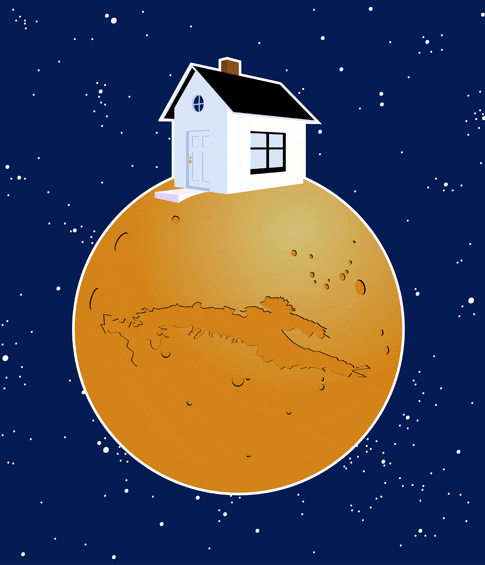Buzz Aldrin is fondly remembered as the second man to ever step foot on the moon, after his more famous compatriot Neil Armstrong. The former astronaut, now 78, is back in the spotlight after proclaiming that, should the United States space program send a mission to Mars, those astronauts should be prepared to stay there.
Aldrin, speaking to the AFP (Agence France Presse, a global news agency), said the men and women who board the world’s first non-stop flight to Mars should establish a long-term colony on the Red Planet. The time and expense required to send them there warrants more than a brief sojourn, he says, so those who are on board should think of themselves as pioneers. Like the Pilgrims who came to the New World or the families who headed to the Wild West, they should not plan on coming back home.
Aldrin’s own intergalactic trip took eight days round-trip on the Apollo 11 in the summer of 1969. The moon is a “mere” 238,000 miles from Earth. In comparison, Mars is between 34 million miles and 250 million miles from Earth, depending where you take off and touch down. Scientists estimate that rocketing to Mars and back would take a year and a half. “That’s why you [should] send people there permanently,” said Aldrin. “If we are not willing to do that, then I don’t think we should just go once and have the expense of doing that and then stop.”
While the Moon is a shorter trip, it offers virtually no potential for life. Studies suggest that Mars, on the other hand, has vast reserves of frozen water, and more closely mimics conditions on Earth. Humans couldn’t strap on Carhartts and start building log cabins, but with life-support systems and other proper equipment, researchers say they could survive on Mars.
How realistic is this image of a moon boot-wearing, Martian nouveau colony? NASA and the European Space Agency have tentative plans for a manned mission to Mars that would take place around 2030 or 2040. Those who argue against such manned missions say space exploration without humans at the wheel delivers better scientific results, and eliminates the risks of psychological stress and potential damage to DNA from cosmic rays. Aldrin counters that humans, unlike computers, can act independently, a necessary trait for the unexpected decisions that would arise during exploration.
If they do go to Mars, the mission would sign on about six astronauts, though Aldrin argues for closer to 30, enough to establish a colony. If Aldrin were running the space program, it would look something like this:
Age 30: Offer to help colonize Mars is extended.
Ages 30-35: Training.
Age 35: Blast off!
Age 65: “…who knows what advances have taken place. They can retire there, or maybe we can bring them back.”
That would be one pretty huge step for man, and one gigantic leap in sales for Mars bars.
Via: Physorg.com









